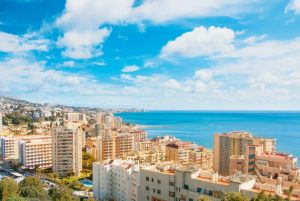
LIMITATIONS AND BANS ON RTA HOLIDAY RENTALS IN ANDALUSIA AND MALAGA

REFLECTION OF THE CURRENT SITUATION IN MALAGA AFTER NEW ANDALUSIAN DECREE OF 22-2-2024
Over the last few years, there has been a significant increase in the number of tourists in many Mediterranean cities as Madrid, Malaga, Seville, Valencia, Alicante or Barcelona. This increase in tourism has materialised into record figures in the purchase of houses for holiday letting. Let’s analyse the current regulations for urban holiday homes in Andalusia and the decisions some city councils are making with the goal regulating and limiting these activities for urban properties. This in end to protect both the living conditions of its habitants as well as the quality level of tourism.
Please note that rural properties or those located on non-developable land being outside its scope, including farmhouses, B&B rural hotels or country cottages are governed by different regulations.
Do you have plans to buy a property in Andalusia to rent out to tourists? Within our due diligence (legal investigation) C&D Solicitors will inform you about any possible restrictions for your specific property.
Why is tourism investment so significant in Spain?
In Spain in 2023 tourism represented 12.8% of GDP, the highest figure ever recorded. In many cities in Spain, tourism is the main source of income and wealth at the local level, with many local shops, businesses and professionals relying on tourism as their main source of income. This growth in tourism has led to investment in the purchase of properties to be used as holiday lets increasing over the last few years, whether these are by individuals, companies or investment funds.
Foreign investment in the purchase of properties has been key to this increase in conveyancing operations, with record figures and prices being seen in cities like Malaga, Marbella, Fuengirola, Benalmadena, Torremolinos, Nerja, Granada and Cadiz. This property investment has led some regional governments and city councils to see record levels of tax income from this property conveyancing transactions.
What are the negative effects of the growth in tourism and the holiday lettings market?
The high volume of property purchases in some tourist cities in Andalusia, where buyers intend to use them as RTA holiday homes, has caused a drop in the supply and a rise in the prices of traditional lettings in these cities. Many residents and people with average salaries face great difficulties in finding affordable properties in some of these tourist towns. This is making it complicated to fill some jobs, such as doctors, teachers, hospitality workers, etc. in these cities, as the salaries paid are not enough to pay a high rent or mortgage.
Likewise, a movement has been growing in certain sections of the local resident population, critical of the situation due to tourist overcrowding, the loss of identity and the loss of comfort for those living in these areas. The quick growth of tourist-oriented businesses in these neighbourhoods has been to the detriment of local and traditional commerce, which used to focus on residents and is now disappearing. This scenario is leading the different affected administrations to take measures to control and limit holiday lettings in Spain.
Are holiday lets profitable in comparison to traditional rental housing?
In 2016, Andalusia approved Decree 28/2016, of 2 February, on holiday lettings. In 2024, Decree 31/2024 of 29 January was enacted, amending different provisions of the 2016 Decree. The statement of the new 2024 Decree, explains that it is up to municipal councils to set up different uses, including tourist use, within the different types of land, whether residential, commercial or other.
In 2016, holiday lets were defined as those located in properties on residential land and requiring a first-occupancy certificate (LPO). However, the new 2024 Decree defines holiday rentals as those fit for immediate use that comply with municipal zoning regulations. In other words, the concept of residential land and the actual to have an actual first-occupancy certificate is now eliminated within the REGIONAL law.
This Decree also makes it possible for city councils, citing reasons of general interest, to establish limits in terms of the number of holiday lets per building, area, sector or period. The few months that have elapsed since the implementation of the new Decree, along with the decisions and legislative amendments some city councils have made, have enabled us to understand the consequences of this regulatory change in Andalusia better.
What was the most important regulatory change in Andalusia for holiday lettings in 2024?

The main change in Andalusian regulations in 2024 comes from the elimination of the term “residential land” established in the 2016 decree. That is the elimination of the definition of holiday lets as those located in properties located on residential land.
The change in the law means that each municipality since 22-4-2024 now is responsible for organizing the use of homes used for holiday lettings on different qualifications of land (such as residential, commercial or other) within the General Urban Development Plan (PGOU). Before these city councils didn´t have any influence in this.
Existing RTA Rental licenses from before 22-2-2024
It’s important to note that all properties registered in the RTA before 22 February 2024 are governed by the 2016 decree, with holiday lettings being considered residential use and with the property therefore requiring an LPO. Properties already registered in the RTA will be able to continue to operate their holiday letting activity under the old regulations.
What is the most important consequence that this 2024 change has brought to the holiday lettings market in Andalusia?
The fact that a municipality, through its local urban plan PGOU, considers holiday lettings or tourist rentals as those located in residential land or not, has very significant effects in practice.
If the local PGOU plan of the municipality defines holiday lettings as a commercial hospitality service (i.e. those in properties located on commercial land and not those located on residential land) this means that it is making holiday lettings equivalent to hotels, hostels, inns, tourist apartments, etc.
PGOUs establish more limitations and requirements to operate holiday lettings in this commercial use of land. If the PGOU establishes holiday lettings as those located on residential land, it will only require a first-occupancy licence to engage in such activities.
FOR EXAMPLE: On 9 February 2024, Seville amended its PGOU based on the new Decree from the Regional Government and changed the classification of holiday lettings to a commercial hospitality service and not a residential-use service. The PGOU in Seville introduced a series of specific requirements for properties to be used as holiday lets in that city.
What is the process to register a property in the Andalusian Tourism Register (RTA)?
As we’ve explained before, to use a home as a holiday let in Andalusia, it needs to be registered in the RTA (Registro de Turismo de Andalucia).
- RESPONSIBILITY DECLARATION: This registration is automatic and takes place through an online declaration. In other words, the applicant (like a rental agency) or owner submits the registration form online and declares, under his or her responsibility, that the home complies with the requirements established by Andalusian regulations to be used as a holiday let. At that time, a notification is received, which is equivalent to the registration document, with its corresponding holiday lettings number (VUT).
- RULES DETERMINED BY TOWN HALL (PGOU): The requirements that a property must meet to be used for holiday lettings in Andalusia are the requirements established in the local PGOU of the municipality for holiday lettings. This in addition to the structural and equipment requirements of the property, which the Decree establishes in its appendices.
- TOWN HALL CHECK: When the Regional Government receives a declaration to register a property in the RTA registry, it sends a notification to the City Council where it is located so that it can decide whether the property complies with the necessary requirements established by municipal regulations for holiday lettings.
How are the new municipal regulations applied to the registration process of a home in the Andalusian Tourism Register (RTA)?
Since the City Council receives a notification from the Regional Government of Andalusia for each registration in the RTA, we understand that the City Council will, at some point, review the registration of that property in the RTA, to check whether it complies with municipal regulations.
- RESIDENTIAL LAND: If the PGOU of the municipality or the specific ordinance governing this considers holiday lets as those on residential land, the property will require an LPO to operate as a holiday let.
- COMMERCIAL LAND: On the contrary, if the PGOU considers holiday lets as those properties located on commercial land or land with individual use, it will establish further requirements for the operation of holiday lets.
If they are considered to be on commercial land or land with individual use, they may require the properties to have access independent from the rest of the building. This also applies to independent utilities and connections, to be on the ground floor or on the first floor, etc. This will depend on the PGOU in each municipality.
What if a property doesn´t meet the Town Hall´s criteria
We understand that, in the process for the municipality to review RTA registrations, if the City Council considers that the property does not meet the requirements, the owner or the operator will be notified so that the latter may show compliance with the requirements within a certain period, if it is possible to remedy the inconsistencies. If it is not possible to comply with regulations, the City Council will request that the Regional Government of Andalusia remove cancel the RTA license.
What is the current situation of holiday lettings in Malaga?
According to data published in July by the newspaper La Opinión de Málaga, Malaga proper has over 12,000 homes used as holiday rentals. The Malaga city centre has around 4,800 holiday lets and a census of 4,260 people. This means that there are more holiday rentals than people resident in the central neighbourhood of the city.
On Saturday 29 Junne, 15,000 people took to the streets of Malaga to protest tourist overcrowding and demand a limit on holiday lets. On 7 June, the Malaga City Council enacted Instruction 1/2024 on holiday lets. In this instruction, it established that in accordance with its PGOU, since the entry into force of the Decree holiday lets are considered to be under commercial and hospitality use and not under residential use.
This means that any property owner seeking to let the property in the holiday lettings market in the city of Malaga must comply with following two extra requirements from 22 February 2024.
- The property must have adequate means of access and evacuation independent from the rest of the building.
- Utilities (electricity, water, phone, etc.) need be completely independent from those of the rest of the building.
What is the situation of holiday lets in the city of Malaga registered in the RTA after 22 February 2024?

The Malaga City Council has stated that properties registered from 22 February 2024 must comply with the new requirements for commercial land and accommodation.
At some point, the City Council is supposed to review these registrations and notify the owner or operator of the start of a review procedure of the registration, with the goal of checking whether the home complies with the new requirements. If it does not, the City Council should request that the Regional Government of Andalusia remove the property from the RTA automatically. To date of publishing this article, we have not heard of the City Council starting any review procedures yet.
Future ordinances in the city of Malaga to regulate holiday lets
The instruction we’ve mentioned above, enacted by the Malaga City Council on 7 June, is TRANSITIONAL, as the City Council is working on a new municipal ordinance. This new ordinance will regulate holiday lets specifically, and also probably introduce new limits or bans on new holiday lets in saturated areas, such as the historic city centre.
Reason for fear or panic when buying a property?
Some news articles in countries like the Netherlands or Britain refer to limits or bans on holiday lets in some tourist towns in Spain and, in my opinion, these claims are somewhat sensationalist. In my opinion, the fact that, in certain towns, holiday lets are limited or directly prohibited in areas very saturated by tourism, should not lead to alarm and panic among investor clients. With or without holiday lettings, property investment in Spain is and will continue to be profitable.
Holiday lettings will continue to be possible in many cities and neighbourhoods, perhaps with more requirements and limits, but holiday lettings will never be banned or limited completely. This debate should be approached with logic. For instance, if in the centre of Malaga there are more holiday lets than registered residents, it’s obvious that the area requires stricter regulations for new holiday lets.
Most of us who live in Malaga, as well as foreign clients who visit, consider that the city centre is overcrowded with tourism, with streets being full of people almost every day of the year. It’s a shame for local identity and traditional businesses to be lost and for the centre to be used solely as tourist accommodation for visitors.
On the other hand, tourism is the main source of income for many cities in Spain and, of course, for the city of Malaga, for which reason we’ve got to take care of tourists and treat them in the best way possible. Many of us live thanks to them and our company isn’t an exception.
It would be a big mistake not to try to strike a balance between tourist activities in a city and the residents who live in it. If we don’t try to get both groups to live and coexist in a balanced way, this will lead to dissatisfaction and pit different groups against each other and, in the end, will lead to extreme measures, due to not taking any intermediate steps before the problem becomes difficult to solve.
Is it profitable to buy a property without using it as a holiday let?
It’s obvious that holiday lettings are behind a significant increase in the purchase of properties in many tourist towns in Spain, as this activity has provided owners with good profits. If limits or bans on holiday rentals start to be implemented, these will affect the number of property purchases in the areas where they are implemented, in one way or another.
Notwithstanding the above, the machine of property investment and the interest of foreign clients in buying homes in Spain, specifically in these tourist areas, will not grind to a halt due to limits placed on holiday lettings. In other words, a limit in holiday lettings by itself will not cause a slump in the property market.
Costs of exploiting holiday rentals
Holiday lettings have significant operating costs, which reduce net profits, such as the cost of the company that manages the property, which ranges from 17% to 22%. The tax cost of the rent received, for which EU residents pay 19% of profits, non-EU residents pay 24% and Spanish residents declare it as income from work, which means they pay according to the income tax bands. Likewise, for non-EU residents it is not possible to deduct certain expenses or maintenance costs for the property in the case of holiday lets.
Long-term renting
In the city of Malaga, traditional lettings also provide good profits for property owners, as long-term rental prices have doubled in the central area since 2021, for instance. Currently, average rent prices in the area are around 1,400 euros per month.
The entire city of Malaga has a low supply of traditional lettings and this has made the rent prices of such properties very high at the moment. This situation can be extrapolated to many municipalities in the Costa del Sol, such as Marbella, Benalmádena, Fuengirola, Mijas or Nerja, as the dwindling supply has led to record prices in traditional lettings.
Let’s remember that, if the owner is tax resident in Spain, traditional lettings have significant tax benefits, which range from 50% to 90% of rent being tax-free. Sometimes, emphasis is made on the gross profit obtained from holiday lettings instead of the net profit after all costs and taxes are paid.
The city of Malaga is very attractive to digital nomads, administration officials and other liberal professionals seeking to live and work in Malaga. In other words, you can look for a tenant profile that is acceptable, with proven solvency, reducing the risk of rent non-payment.
Rental per room
Another very attractive market is the letting of flats to students by the room. These prices are also very high at this time and there are companies specialising in letting homes to these students, with large profits. It should also be noted that, if the property owner is tax resident in Spain, part of the rent received from the property would be tax-free.
Conclusion about alternatives for RTA holiday rentals
With all the above, I mean to say that, in Spain, there are always options to obtain good investment returns from property purchases beyond the holiday lettings market.
Properties registered in the RTA prior to the limits being introduced may continue to operate as holiday lets and new ones will be registered in the RTA for this activity, if they meet the new requirements established by each City Council.
What is the current situation of the property market in Andalusia?

The increase in interest rates over the last two years, the low supply of homes in some tourist areas and high property prices in others has already led to a decrease in property purchases in some tourist towns in Spain in the first half of 2024, compared to the same period the year before.
Prices have not yet suffered and continue to be at an all-time high in many tourist towns. It also wouldn’t be bad for some of these areas to see a drop in prices in the property market, as this would attract future investors. For the property market to suffer an adjustment and prices to begin dropping at some point doesn’t mean we’re in a crisis or be cause for alarm.
This potential price drop shouldn’t be blamed on limits or bans introduced on holiday lettings in certain tourist towns. Obviously, these limits or bans in specific tourist towns will affect supply and demand, but there are many other factors to be taken into account.
What should I do to buy a property with certainty and without risking my investment?
You need to hire a lawyer specialising in property and land law, who is very familiar with this area of the law and who can inform you of the legal status of your property during the process. Without a doubt, a legal report or due diligence is the appropriate document that a lawyer should offer you for your peace of mind.
Not instructing a lawyer in the process to purchase a home in Spain or not instructing the right lawyer for this process can be a big mistake. The cost of a lawyer is very small in proportion to the price you’ll pay for the property or other legal costs relating to conveyancing.
C&D Solicitors, specialist lawyers in property law in Andalusia
At C&D Solicitors, we specialise in providing property advice to foreign clients, whether individuals seeking to buy a second home or an investment property in Spain, as well as investment companies or investment funds seeking to grow their asset portfolio and take advantage of the capital gains they can obtain in the property market and in property operation.
We offer “full service” advice throughout the process in your native language: English, Dutch, Swedish, French and German. You can call us at +0034 952 532 582, send us a WhatsApp message at +34 639 54 16 02 or write to us at info@cdsolicitors.com. We’ll look into your case, we’ll send you information about the process and a cost estimate for this, with no commitment whatsoever.
Author: Gustavo Calero Monereo, lawyer at C&D Solicitors (Torrox & Malaga, Andalusia)

